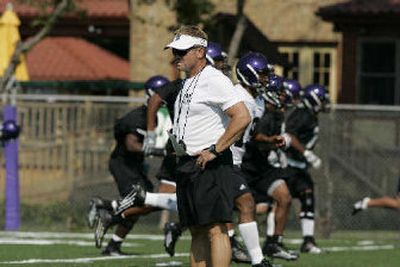Death of Northwestern coach recalls life’s lessons learned

CHICAGO – Randy Walker liked to say that, farm boy though he might appear to be, he didn’t just fall off a pickle truck. But you would have felt better if he had supplied some proof. Or at least removed the kosher dill tag from his work shirt.
I think of a man given to sayings, axioms and corn-fed ideas that seemed to come from another time and place. Ohio, 1950, maybe.
I try to think of a man imploring his players in meetings to move the plow together in the same direction, and half of the city kids thinking, “What’s a plow?”
I think of a good man who had the best intentions.
I think of a man who lived by a rigid set of rules that had served him and others well for years. I think, too then, of a man who was shattered by the death of one of his players who had been living by those same rules and dreaming those same dreams.
Walker died at 52 on Thursday night, apparently of a heart attack, and no matter what anyone wants to say about anything that occurred on his seven-year watch at Northwestern – all the victories, the three straight bowl games, 22-year-old Rashidi Wheeler’s death in 2001 – the guy cared. Don’t try to say otherwise.
I think of the shame of it all, of two men, both gone away much, much too soon. I think of the overwhelming bitterness of Wheeler’s mother, and hope this once and for all pushes some of the pain away for her – not because it makes up for anything but because life is too short, because too many people are hurting and because it’s all so useless.
Walker lived by those basic, difficult rules of his, and inside those rules was a lot of room for compassion. So when Wheeler died after an asthmatic seizure during a controversial off-season conditioning session, Walker died a little bit, too.
“It never made me waver about Randy as a person or whether he was right for us,” Northwestern President Henry Bienen told reporters. “It was a terrible experience. Randy never lost his concern for the loss of a friend and a player and also what he knew to be the impact on the family. Once again, Randy handled himself with great class through the whole thing. It surely was difficult.”
Yes, here was a man who cared, and you could send a search party out into the college football world and not find many who cared more.
I think of a man who had the conviction to stay at one school for a long time because he thought he could continue to build success there, because he saw possibility, because he saw that the artificial turf wasn’t always greener on the other side of the fence. He was loyal in a business that almost considered loyalty a weakness.
I think of a man who stood up for his kicker last season when boosters, on national signing day, got their digs in on the kid because of his rough performance in the Sun Bowl.
“Nobody out there has ever walked into an arena with 50,000 people and had to make a kick that meant anything,” Walker told reporters later. “Unless you’ve been in that arena – I guess you can laugh and smirk and be sarcastic. I’ve been in that arena, and I know what it’s like. I respect and like the people who go in there.”
Here’s a guy who got it.
I think of a guy who got it and passed it on to his players. There are former Walker players around the country who don’t strap on shoulder pads anymore, but they know the meaning of an honest day’s work.
“I learned a long time ago that there are some things you can’t control,” Walker said. “I would have loved to have been 6-2. The good Lord made me 5-foot-8. What you try to do is make the most of the things you can control. You can control how hard you work, how passionate you are about what you do and the commitment you make to something.
“… Those are all things we expect. Gosh, it’s a pretty easy game, really.”
And yet, this was a man who wasn’t afraid to change offenses, given circumstances. He had been a run-it-down-their-throats running back and coach at Miami of Ohio. He arrived at Northwestern in 1999 and soon saw the need to open up things on offense. He spent time with the St. Louis Rams offensive staff, and what might have looked like Al Gore meets the National Rifle Association turned out to be brilliance. Walker was open to new ideas, even if his center-part hairstyle wasn’t.
He’s gone now, too soon. It’s Northwestern’s loss. It’s college football’s loss. But it’s also a loss for a whole bunch of kids who were getting ready to learn about hard work from him. Randy Walker had a lot of teaching left to do and left a lot of players with a lot of learning to do.
That’s the biggest loss.